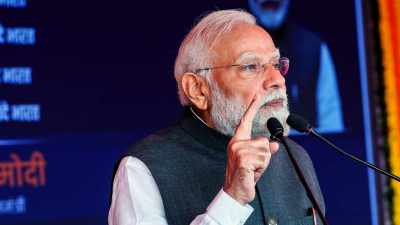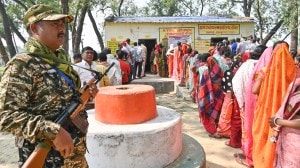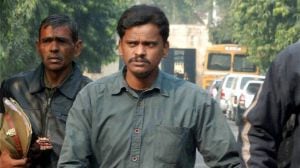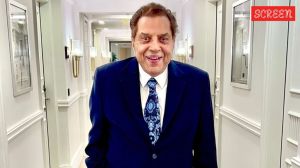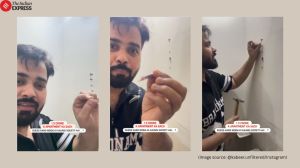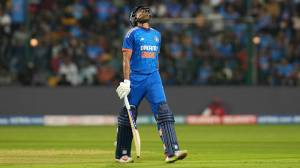There is a massive influx of outsiders into Mumbai. Even as we talk,many people may be getting off at the station
Shiv Sena executive president Uddhav Thackeray speaks about the partys stand on outsiders and its strategies for the 2012 BMC elections
In this Idea Exchange moderated by Loksatta Executive Editor Girish Kuber,Shiv Sena executive president Uddhav Thackeray speaks about the partys stand on outsiders and its strategies for the 2012 BMC elections
GIRISH KUBER: The Shiv Sena is now 45 years old. The public sees the party with a mix of fear and curiosity. What does the changing environment in the state mean for the party?
Uddhav Thackeray: I remember (journalist) Rajat Sharma once asked Bal Thackeray about people being afraid of him. He replied saying people will be scared of a lion and not a rat. The Shiv Sena chief and my uncle Shrikantji (Raj Thackerays father) felt Maharashtrians had always been struggling. Mumbai was included in Maharashtra in 1960. At the time,Yashwantrao Chavan (the former chief minister) had said that Mumbai was part of Maharashtra but Maharashtra was not seen in Mumbai. That clearly means the influx of outsiders had begun in Mumbai and Maharashtrians had become strangers in Mumbai. Shiv Sena was set up in 1966. After that,the battle for Maharashtrians and the sons of the soil began. Ever since,the Shiv Sena has been helping Maharashtrians live with self-respect. As for the future,the allegation is that
Uddhav Thackeray is trying to change the face of Shiv Sena. The face of the Shiv Sena is not so ugly that it needs to be changed.
PRASHANT DIXIT: Is the Shiv Sena more accommodating towards outsiders who have settled here for generations?
Uddhav Thackeray: There was no question of Maharashtrians and outsiders. I am a Mumbaikar,I was born in Mumbai and love Mumbai,I love Maharashtra and I will say Mee Mumbaikar. If anyone tries to hurt Mumbai and Maharashtra,the Shiv Sena will counter it. I feel city dwellers need to inculcate discipline. The Mee Mumbaikar concept was restricted to that. Our stance is clear: some families have stayed here for 100 years,we have no objection to that but even today,there is a massive influx (into Mumbai) and even as we talk,many people may be getting off at the station.
After the linguistic reorganisation of states was carried out,every state got its capital but Maharashtra had to struggle for it. Maharashtrians are hence touchy and should be touchy when it comes to Mumbai. This is the anguish of Maharashtrians. No one leaves home happily. They quit their homes as they do not get enough to eat. Now if state governments are incompetent,it is wrong to expect this government to take care of not just people here but of those who come from outside too. If the governments of all states decided to work,their people would stay back.
GIRISH KUBER: Mumbai has witnessed migrations ever since its birth but in the 80s,the mill workers strike led to Maharashtrians leaving Mumbai in large numbers. Today,out of 36 assembly constituencies,about 27 have a majority of north Indians. Do you believe the Sena should have stopped those migrations?
Uddhav Thackeray: Sure,but what if someone willingly leaves (the city)? It is wrong to say that anyone can stay anywhere. Can anyone stay in your house after throwing you out? Others are coming here and forcing themselves on us. Maharashtra and Mumbai have never shirked from their national obligations. We will always strive for the country but at least allow us to stay in our homes in peace. Maharashtrians must stand united and show faith in the Shiv Sena chief and give him complete powerlike Nitish Kumar came to power in Bihar,Narendra Modi in Gujarat,Mamata Banerjee in Bengalgive us the opportunity to implement our policies.
DINESH GUNE: In 1995,when the saffron alliance came to power,the first chief minister (Manohar Joshi) mooted the permit system to stop the influx into Mumbai,but within three-four days,he retracted his stand. In the five years that your alliance was in power,what did you do to solve the problem?
Uddhav Thackeray: We worked for the mill workers. The discussion on the one-third formula (of sharing mill lands) was underway,but unfortunately the government lost power in 1999 before it could be implemented. After that,things went downhill. A thumping single party majority and a government enables one to prove if they have the guts to implement their agenda.
DINESH GUNE: But how will you throw people out? How will you deny entry to them?
Uddhav Thackeray: We must understand the intricacies. If local boys and girls do not get jobs here,are they going to get them elsewhere? To stop the influx of migrants,we will need a policy that says 80-90 per cent or even 100 per cent jobs are to be given to the sons of the soil.
GIRISH KUBER: Do you think Mumbai should be given an independent agency to handle its various problems?
Uddhav Thackeray: If you want to make BMC responsible for everything,give them the rights. But you are creating alternative agencies and then you start work without consulting BMC.
SANDEEP ACHARYA: Who can be projected as your partys candidate for chief minister? Would you like to be CM?
Uddhav Thackeray: It is not my dream to become CM. I may want to become anyone,but would people like it? Why should I impose my wishes on people? My only aim is that Maharashtrians should live a happy and satisfied life.
Girish Kuber: When Balasaheb started Shiv Sena,he was surrounded by artists,writers and thinkers. Now that image has changed. Why did the Sena leave its Marathi plank and embrace Hindutva?
Uddhav Thackeray: The Sena chief is a creative person. That generation (of artists) was different. After Islamic terror became a reality in the country,there was a need to unite people and even Marathi people united under the banner of Hindutva. Narendra Modi came to power using the Hindutva plank,now he is talking about Gujarat asmita. No one asks him about Hindutva,why ask us? Why should we feel ashamed about Hindutva or Marathi?
GIRISH KUBER: Has Hindutva hampered the Marathi cause?
Uddhav Thackeray: Hindutva has strengthened the Marathi cause. It has set aside differences of caste and brought people together under Hindutva. The Congress plays caste politics and fields candidates who belong to the largest caste. Many of our candidates won despite not being from the dominant caste in that ward. How do you explain that? Basically,why do you differentiate between Marathi and Hindutva?
UMAKANT DESHPANDE: Has the party looked into why it has been out of power in the state?
Uddhav Thackeray: Tell us what we did not do when in power. We built flyovers,the sea link,Mumbai-Pune expressway.
PRASAD MOKASHI: The BMC elections are coming up. There has been talk that the Shiv Sena will field non-Marathi candidates in some parts of Mumbai. How will you handle the migrant issue in those areas?
Uddhav Thackeray: The wards are the same and they have remained the same for the last 15 years. In those wards,almost 99 per cent candidates are Marathi.
PRASHANT DIXIT: Is it your policy that migrants who are beneficial to Maharashtra are welcome?
Uddhav Thackeray: Those who have been living here legitimately can stay.
SANDEEP ACHARYA: If asked to choose between photography and politics,what would you choose?
Uddhav Thackeray: Both are completely differentphotography is my hobby,it is my oxygen. When you have a hectic life,you need this breathing space.
SANDEEP ACHARYA: The Sena chief has always criticised dynastic rule. But now the third generation of Thackerays is in politics.
Uddhav Thackeray: It is not dynastic rule,it is a family tradition. The difference between us and the Gandhi family is that they became prime minister while we did our work. Balasaheb never became chief minister,neither do I want to become,nor does Aditya. Even my grandfather was a social activist,he fought for issues. Aditya is still in college,studying law. Two years ago,he said he had not been going to college for two months and no one had asked why. He said students were at home since teachers had gone on a strike. He said no one was raising students issues and said they were on the verge of losing an academic year. I suggested that he should meet the Governor and raise their concerns as he was best suited to do so. That is how his journey started. After this,students went to him with various issues. In the last one year,the Yuva Sena has attended to problems of students.
ROHAN TILLU: When in power,Balasaheb said he wanted a CM who will take orders from him. Is that the right thing to do?
Uddhav Thackeray: Tell me the difference between remote control and high command. Now all the chief ministers in Maharashtra seek permission from Delhi before they do anything.
MADHU KAMBLE: What is your opinion on the reservation policy?
Uddhav Thackeray: The position of the Shiv Sena chief is very clear on this. The basic needs of every person are the same and they know no caste. I am not opposed to reservations as such,but the point is to make the people from these sections of society capable. Otherwise,it does not serve the purpose of social justice.
SANDEEP ACHARYA: With the civic elections coming up,what would you say about your political alliance with the BJP?
Uddhav Thackeray: The alliance is as strong as ever. The Shiv Sena and the BJP have been allies for a long time,and now Bhimshakti (Republican Party of India) has also joined us.
GIRISH KUBER: Ahead of the next general elections,there has been talk about the NDA not being in a very strong position.
Uddhav Thackeray: More than the NDAs future,I am worried about the future of the country as a whole. At present,the question is whether this country really has a leader in the true sense of the term. One thing was certain about Atalji (Atal Bihari Vajpayee)those who were opposed to the alliance may not have voted for him,but no one said unfavourable things about him personally. At present,there is only Balasaheb who will say what he thinks,and to a certain extent,there is L K Advani. No Congress leader has tried to tour the country like Advani.
Even as we talk about Mumbai,Chinese troops are looking to infiltrate parts of Kashmir. For all you know,Pakistan Occupied Kashmir might become China Occupied Kashmir tomorrow. Even in the north-east,China is giving us trouble. In other parts,Maoists are also raising their heads. The entire country is under attack. On the issue of corruption,we have ourselves proclaimed to the world that we are dishonest and this has certainly affected our image. On one hand,we let dangerous projects like the one at Jaitapur come up,and on the other hand,due to our image,we find it difficult to secure genuinely good development projects.
ROHAN TILLU: When your party came to power in 1995,there were some major issues which held sway at the timeHindutva,for instance. For the upcoming elections,what is your plan?
Uddhav Thackeray: During previous elections,I had taken up the issue of the agrarian crisis. There is the issue of load shedding too. In rural areas,electricity is available only at night and that doesnt help farmers in their fields. On the other hand,electricity is given on a priority basis to IPL and other cricket matches. I am not against that,but the same urgency should be shown to farmers as well.
We are quite clear: our concern is for the whole of Maharashtra,including the rural areas. For a year or so,the number of farmer suicides seemed to have gone down slightly,but now it is rising again. Recently,one of Kalavatis daughters also ended her life. In the past 16 years,thousands of farmers have ended their lives. People did not die in such large numbers even during the freedom struggle.
GIRISH KUBER: Many of the problems that affect Maharashtra also affect the rest of the country. On such issues,there does not seem to be any dialogue between the Sena and other political forces,be it Mamata Banerjee or Narendra Modi.
Uddhav Thackeray: The need for different regional parties to come together is an important one. We had tried to arrive at such a dialogue when the NDA was in power. But every region needs to think about itself and its development. When all states in the country attain a certain level of development,the problem of migrants will automatically be solved. For the ordinary person,the government in Delhi is far away. The regional parties are more rooted in the local issues. The issue of nuclear projects,for instance,is one that the entire country faces. I believe all regional leadersbe it Mamata Banerjee,Jayalalithaa or myselfshould come together and resolve these disputes once and for all.
PRASAD MOKASHI: You spoke of the need for a leader. Do you think regional parties will make governments more decisive?
Uddhav Thackeray: Yes,of course. There was a question about who the prime ministerial candidate should be. But the real question is,does the nation have a prime minister at all at present? So many scams are tumbling out,but the prime minister is not saying anything. He does not seem to be taking any decisions. Earlier,industrialists had a good opinion of him and would say that he is a good man. Now,the same people are complaining that nothing is moving.
PRASHANT DIXIT: You have been in politics for about 20 years now. Apart from Balasaheb,who do you look up to in politics?
Uddhav Thackeray: To be honest,I have never thought of anyone other than Balasaheb in that light. He is my father,and I have experienced what it is like to be in close contact with him. I do not emulate him but his ideas are very much in my blood. In a way,not imitating anyone is also a legacy that I have got from Balasaheb.
ROHAN TILLU: What is your opinion of political censorship of films and other art works,especially since you are a lover of art?
Uddhav Thackeray: I believe art should always be such that would be pleasing to the senses. If it leads to conflict,then it is not art.
Transcribed by Dhaval Kulkarni,Swatee Kher & Neerad Pandharipande
Photos



- 01
- 02
- 03
- 04
- 05


